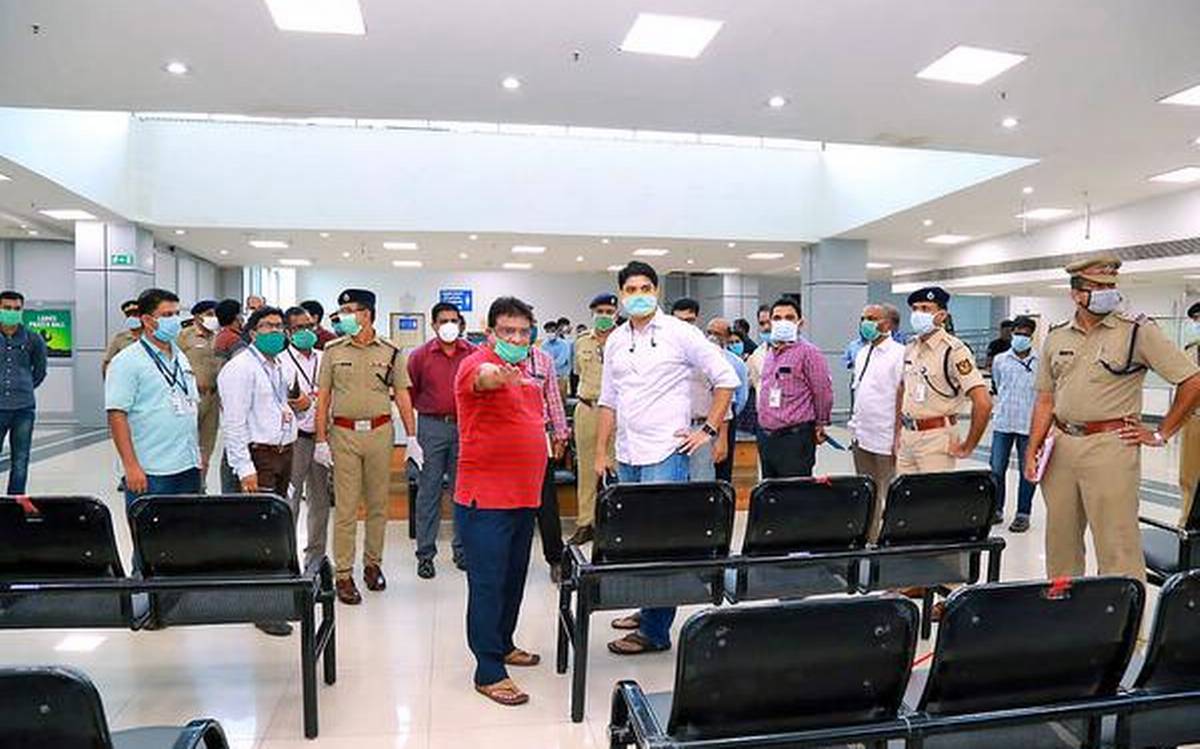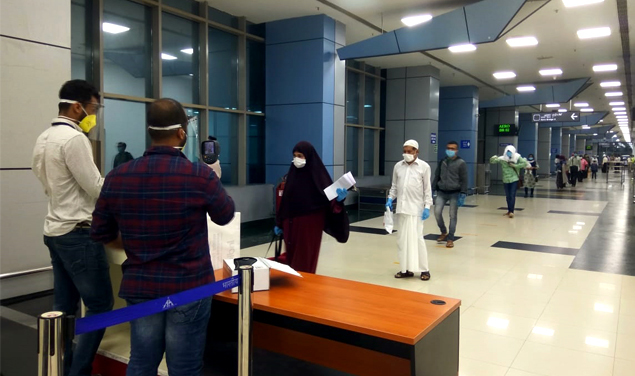Returning expats to Kerala face job losses, salary cuts amid COVID-19 pandemic

By Najiya O, TwoCircles.net
Ismail from Kozhikode was working in a cafeteria in Bahrain when the COVID-19 crisis hit the country. Within weeks, business at the cafeteria was hit and the staff was reduced to just three people. Ismail decided to go home and reached Kerala on May 10 and stayed in a quarantine centre at Feroke for more than two weeks.
“If something can be worked out, I would like to go back to Bahrain. If not, I will stay back in Kerala and do some work here. Got to move life forward somehow,” he told TwoCircles.net.
Ismail expressed his content with the free of cost facilities provided to the expatriates at the centre.
Thousands of quarantine centres are run by the government in different parts of the state since the crisis began, and such centres were opened for the returning expatriates too. Stay, food and treatment were free of cost.
The state government had made it clear that Kerala was well-prepared for the influx of the non-resident Keralites, emphasising on the arrangement of 2 lakh beds, screening at airports and railway stations, quarantine centres, etc.
However, the Chief Minister announced a few weeks ago that the government would now charge money from the expatriates for quarantine facilities, as against earlier when everything was provided free.
Another expatriate Yahya from Palakkad has been working in a private company in Qatar. When the company incurred losses and closed down due to the COVID-19 crisis, he wanted to try elsewhere for a job but the pandemic was worsening in the country and he decided to return home.
Yahya returned to Kerala on March 12, and as the COVID-19 pandemic situation has only worsened, he decided to stay back for some time and started working with a company here.
“When travel is restored, we can’t be sure if our jobs would still be there,” he said.
Losing jobs is not the only issue facing the expatriates who have returned. At least some of them had come to Kerala on short or long leave, but could not return. They have not officially lost their jobs, but are in effect unable to make a living. Even the immediate relief of Rs 5000 announced by the state government was a big blessing for those who are living a practically jobless life for months, but the relief has not been distributed yet.
Usman from Malappuram has been working as a driver in a private company in Dubai. He came to Kerala on leave in January end and has not been able to go back. “I have a visa until the end of the year, but I don’t know when I can go. I am also confused about what I would do if I have to stay back,” Usman told TwoCircles.net.
[caption id="attachment_437522" align="alignnone" width="635"] pic from timesofindia.indiatimes.com[/caption]
pic from timesofindia.indiatimes.com[/caption]
However, the father of three children is hopeful that he would be able to go back and continue to work as before.
Abunnasr from Malappuram was working as an accountant in Dubai. With the pandemic spreading in the city and the company cutting down employees, he had to return to Kerala in June first week. He too is confused whether he can return to Dubai and search for a job afresh. Nor has he decided on what to do for a living in Kerala.
Abdulla from Malappuram was working in the travel industry in Kuwait. When the pandemic began spreading in the Gulf country and businesses began to get hit, he came to Kerala on leave. He reached in March beginning and stayed 28 days on home quarantine. By the time his quarantine period was over, the country had come under lockdown and all international flights had been cancelled. “Life is going on. But I am living without a job for months. Till now, there is no problem. But I don’t know how long this can go,” he told TwoCircles.net.
More than a hundred Keralites have lost their lives to the deadly virus in the Gulf countries. And many hundreds have been infected too. When they had the option to return to their home country, after they had been stuck following the cancellation of flights in March, the expatriates registered en flock to return. This was despite the fact that they had to pay a huge sum on the flight tickets, while a large number of them had lost their jobs or had cuts in their salaries.
“There are millions of dirhams in the Indian Community Welfare Fund, collected via the Indian Embassies. That could be used for setting up quarantine centres for the Indians in the Gulf countries itself, or for their return journey to India,” said Ibrahim, president of the Dubai chapter of the Kerala Muslim Cultural Centre, the organisation of non-resident Keralites, run by the Muslim League, and has a presence in several countries around the world as well as in different states of India.
However, the attitude of the different governments in the state towards expats has always been the same – the money and wealth of expats were welcome by way of contributions and investment, while little had been done for their welfare and rehabilitation especially at a time when they are returning en masse.
When the Kerala government invited registrations from non-resident Keralites who wished to return due to the COVID-19 crisis, around 5.63 lakh registered, with 4.13 lakh of them being from abroad (as per the data published on the NORKA Roots website as of May 3). And among them, nearly 50,000 had cited the loss of jobs as the reason for return. As of June 2, a total of 1,43,989 people have returned to Kerala from other states and countries.
“There have been a few positive talks about the rehabilitation of those expats who have lost jobs, but no concrete steps have been taken yet. We demand the state and central governments to take concrete steps in this regard,” said Razak Paleri, president of the Pravasi Welfare Forum, Kerala.
Paleri put forward a few demands of the Forum for the returning expatriates, such as the immediate distribution of the Rs 5000 announced by the Kerala government to the returning expatriates, including the ration cards of those who have lost jobs in the priority list, bringing back all the expatriates who wished to return, etc.
According to the Kerala Migration Survey of 2018, conducted by the Centre for Development Studies and coordinated by Dr S Irudayarajan and KC Zachariah, the number of emigrants from Kerala spread across the world is estimated to be 2.12 million, with the Gulf region being the top destination having 89.2 per cent of the total migrants. The total remittances of the emigrants to the state have been estimated to be Rs 85,092 crores. However, the survey finds a decline in the migration trends after 2013, the reasons for which were mainly estimated to be loss of jobs, family issues, illness etc.
Reverse migration had taken place in the state in the past too – during the Gulf War, the recession in 2008 and during the implementation of the Nitaqat Law (nationalisation) in Saudi Arabia.
The remittances are estimated to have a 15% decline following the COVID-19 crisis.
However, Dr MH Ilyas, professor of development studies at the Mahatma Gandhi University, Kottayam, who has researched on the aspect of migration in Kerala, sees this reverse migration as a positive brain regain, as against the brain drain of yore. “More investments would come to Kerala, as those who are now investing in the Gulf countries would turn to Kerala as a safer place. There would be a crisis immediately, say, for about two years. But after that investments would come to Kerala, and the state can utilise the experienced hands of the returning expatriates for better development,” he said.
He pointed towards the prospect for a good investment, especially in the health sector. “This reverse migration from the Gulf has come along with the replacement migration inside the country. Instead of the semi-skilled and unskilled labourers from other parts of the country who have returned to their states, those who have returned from the Gulf can join the skilled workforce of Kerala. Initially, there would be a problem of wages, but that too would gradually disappear in the wake of the availability of jobs.”
“The spending pattern of the Gulf families would have to change, they would have to learn to adjust with the lesser income that they have. People would get into useful and needy businesses, instead of those catering only to the spending nature of the Gulf families. This would affect production, productivity etc. The adventurous investment of Keralites, especially Muslims, would change to a more intelligent investment, based on need and productivity,” Dr Ilyas said. However, he also emphasized the importance of political stability and vision as well as the support of the central government and the bargaining power of the state government. “The second-generation Keralite girls who have been born and brought up in the Gulf, educated in the international universities and are now working in the high profile companies there, would have a lot to contribute in Kerala,” he added.
